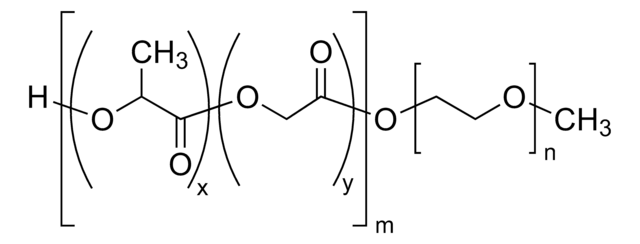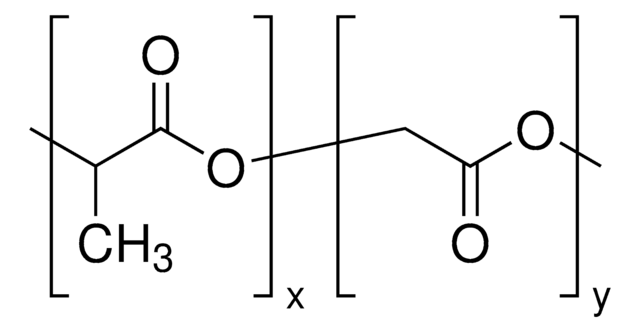추천 제품
설명
typical PEG PDI<1.1; overall PDI≤2.0 (THF, PS)
양식
semisolid
피드(feed) 비율
lactide:glycolide 75:25
분자량
PEG average Mn 1,000
PLGA average Mn 2,200
average Mn (1100-1000-1100)
분해 기간
2-3 weeks
전이 온도
Tm 230-235 °C
PDI
<2.0
저장 온도
2-8°C
유사한 제품을 찾으십니까? 방문 제품 비교 안내
일반 설명
애플리케이션
특징 및 장점
Storage Class Code
11 - Combustible Solids
WGK
WGK 3
Flash Point (°F)
Not applicable
Flash Point (°C)
Not applicable
문서
Local delivery of bioactive molecules using an implantable device can decrease the amount of drug dose required as well as non-target site toxicities compared to oral or systemic drug administration.
Microparticle drug delivery systems have been extensively researched and applied to a wide variety of pharmaceutical and medical applications due to a number of advantages including injectability, local applicability to target tissues and sites, and controlled drug delivery over a given time period.
Aliphatic polyesters such as polylactide, poly(lactide-co-glycolide) and polycaprolactone, as well as their copolymers, represent a diverse family of synthetic biodegradable polymers that have been widely explored for medical uses and are commercially available.
Aliphatic polyesters such as polylactide, poly(lactide-co-glycolide) and polycaprolactone, as well as their copolymers, represent a diverse family of synthetic biodegradable polymers that have been widely explored for medical uses and are commercially available.
자사의 과학자팀은 생명 과학, 재료 과학, 화학 합성, 크로마토그래피, 분석 및 기타 많은 영역을 포함한 모든 과학 분야에 경험이 있습니다..
고객지원팀으로 연락바랍니다.






